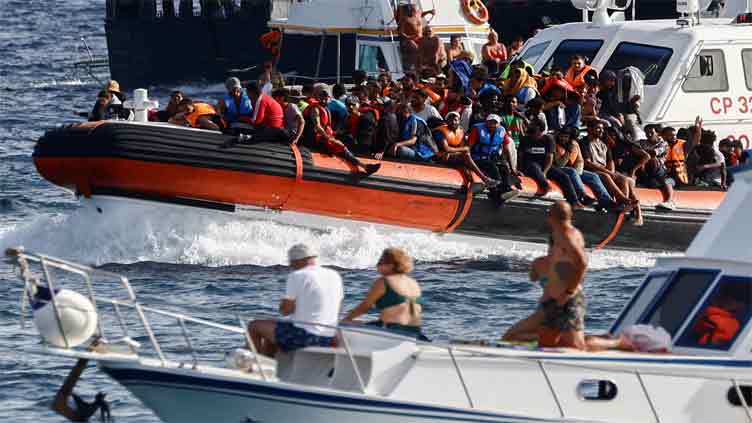Beware illegal Pakistani migrants as Italy is making repatriations limited and costly

World
The Meloni government will detain asylum seekers unless they pay $5,259
ROME (Reuters) – Italy's conservative government said on Friday asylum seekers would be detained while their request for protection was processed unless they could pay 4,938 euros ($5,259) as a type of bail.
Earlier this week, the government announced it would create more detention centres with an eye to increasing deportations as it struggles to contain a surge in migrant arrivals.
However, it faces possibly insurmountable problems both in boosting deportations and building more detention centres. Here are some of the issues at play.
Read more: At least 209 'victims' from Pakistan in Greece boat tragedy, shows official data
ARE MIGRANTS BEING REPATRIATED AT PRESENT?
Yes, but not many.
In 2022 there were 3,916 repatriations to 55 different nations, including 2,724 who were forcibly removed on special charter planes. The vast majority (2,234) were Tunisians. The next largest grouping were Egyptians (316) and Nigerians (95).
To put that in perspective, 105,129 migrants arrived by boat alone last year, including 18,148 Tunisians and 20,542 Egyptians. The next largest national groupings were from Bangladesh, Syria, Afghanistan, Ivory Coast, Guinea, Pakistan,
Iran and Eritrea, accounting for almost 50,000 migrants. Just 23 nationals from these countries were expelled in 2022.
WHY ARE THERE SO FEW REPATRIATIONS?
There are a lot of reasons.
Under international law expulsion orders cannot be issued to asylum applicants, people classed as vulnerable, including minors and pregnant women and foreigners with serious ailments.
Italy says the vast majority of those arriving here do not fall into these categories and are mainly economic migrants, meaning they are not eligible for asylum. Officials say the trouble is Italy has limited accords with non-EU nations for repatriations, which makes it hard to send migrants home.
WHAT REPATRIATION DEALS DOES ITALY HAVE?
In recent years, various governments have signed bilateral readmission accords with various countries, including Tunisia, Egypt and Nigeria. It also has deals in place with Gambia, Ivory Coast and Senegal, but these relate to the repatriation of convicted criminals not migrants.
Speaking off-the-record, officials say both Egypt and Nigeria impose limits on the numbers they will let back in at any one time, explaining the low levels of returns to those countries. As of yet, there are no deals in place with some key countries, such as Guinea, which tops the list so far this year for the number of migrant arrivals (15,207).
HOW IS THE LAW BEING CHANGED?
At present, there are 10 repatriation centres in Italy, which have a capacity to hold 1,338 migrants until their planned expulsion. At present, the capacity is just 619, primarily because the sites have been damaged by the inmates.
The government wants to double the number of centres and have at least one in each of Italy's 20 regions. It also plans to increase the amount of time foreigners can be detained to a maximum of 18 months from a basic three months at present.
It says this extension is needed in cases where the removal operation has taken longer due to lack of cooperation from the migrant or because of delays in getting necessary documentation from third countries. The government has not said what it will do with migrants from states where there is no bilateral treaty or how it will persuade countries like Egypt to take back more of their nationals.
WHAT IS THE REACTION TO THE PLAN?
There has been scepticism and criticism.
Numerous regional presidents and town mayors from across the political spectrum have said they do not want to host new centres.
The cost of opening new centres could be exorbitant at a time of budget stress. Police unions say you need some 100 officers for every 150-200 detainees, suggesting the state would have to launch a huge hiring drive if it was to lock up large numbers of migrants.
Human rights groups say many of the migrants will have to be released after 18 months because of the constraints described above, calling into question the whole point of the exercise.

